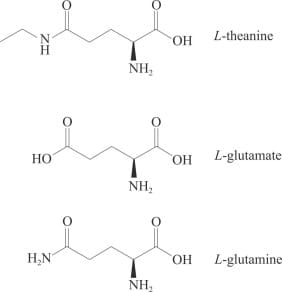L-Theanine: An Effective Anxiolytic and Focus-enhancing Supplement?
L-theanine is a naturally occurring amino acid that has been generating buzz for its proposed anxiolytic, focus-enhancing, and sleep-improving effects!

Hi everybody, today I'd like to discuss L-theanine, a naturally occurring amino acid that has been generating buzz for its proposed anxiolytic, focus-enhancing, and sleep-improving effects!
🍵 What is L-Theanine?
L-theanine is a non-protein/non-proteinogenic amino acid, meaning your body doesn’t use it to build proteins. It's not commonly found in the average Western diet, but it occurs naturally in green and black teas, as well as certain types of mushrooms (e.g., Boletus badius). Most people consume L-theanine passively through tea, but it’s also available in capsule or tablet form as a dietary supplement!

🧠 Some Reported Benefits
L-theanine is most frequently associated with a calm alertness—a subtle mental state characterized by relaxation without feeling tired or drowsy. It has been studied in a variety of capacities, though most commonly discussed is for cognitive and emotional benefits. Here is a super quick overview of two studies:
A randomized, double-blind, placebo-controlled, crossover trial in a small cohort of 30 "healthy" individuals assessed the effects of 200 mg/d of L-Theanine over 4 weeks on stress and cognition. To measure stress, they assessed depression, anxiety, and sleep symptoms using the Japanese version of the Self-Rating Depression Scale (SDS), the State-Trait Anxiety Inventory (STAI), and the Pittsburgh Sleep Quality Index (PSQI), respectively. For cognition, they utilized the Trail-Making test, the Stroop test, and the Japanese version of the Brief Assessment of Cognition in Schizophrenia (BACS).
The authors found statistically significant improvements in the SDS, STAI-trait, and PSQI following L-theanine administration, as well as a statistically significant increase in the BACS verbal fluency. In my personal opinion, these improvements appear modest, though I think it should be noted that this study is over the span of a short 4 weeks.
The second study was an open-label trial in subjects with major depressive disorder (MDD), in which 20 participants were given 250 mg/d of L-theanine for 8 weeks. They utilized similar clinical tests to assess stress/mood and cognition as the previous study, including the Hamilton Depression Rating Scale (HAMD-21), STAI, PSQI, Stroop test, and BACS.
The authors found statistically significant improvements in HAMD-21 and PSQI scores in unremitted patients. STAI scores were significantly improved regardless of remitted status. For cognition, response latency and error rates were improved in the Stroop test, and verbal memory and executive function were improved in the BACS test following L-theanine administration. As compared to the other study, the effects seem greater in this study as compared to the first, though this one utilized a slightly higher dose and was open-label.

Proposed Mechanism of Action
L-theanine is structurally similar to glutamate, a major excitatory neurotransmitter in the brain. It’s proposed to work through several mechanisms:
- Glutamate receptor modulation: L-theanine may compete with glutamate at certain receptors (like AMPA, kainate, and NMDA), which could blunt overstimulation.
- Increased GABA production: It may enhance levels of GABA, an inhibitory neurotransmitter, contributing to feelings of calmness and relaxation.
- Dopamine and serotonin activity: Some studies suggest modest effects on dopamine and serotonin levels, which may contribute to mood regulation.
While these mechanisms are still being investigated, the overall effect appears to be neuromodulatory, gently shifting the brain’s chemical balance potentially toward a more relaxed and focused state.

Side Effects
With current data, this supplement appears safe and well-tolerated, especially at doses up to 250 mg daily, with some potential side effects including GI upset (especially if taken on an empty stomach) and headaches. It is important to note that L-theanine does not appear to cause sedation, motor impairment, or dependence, unlike many anxiolytic medications.

While I wish there were some more large-scale randomized controlled trials on this supplement, the current evidence does seem to support modest improvements in stress/mood symptoms as well as cognition. Of course, the studies I showcased are just a small glimpse into the research that has been performed. Regardless, I hope you enjoyed the article and perhaps even brewed a cup of tea while reading. See you next time!
References:
Hidese S, Ogawa S, Ota M, et al. Effects of L-Theanine Administration on Stress-Related Symptoms and Cognitive Functions in Healthy Adults: A Randomized Controlled Trial. Nutrients. 2019;11(10):2362. Published 2019 Oct 3. doi:10.3390/nu11102362
Hidese S, Ota M, Wakabayashi C, et al. Effects of chronic l-theanine administration in patients with major depressive disorder: an open-label study. Acta Neuropsychiatr. 2017;29(2):72-79. doi:10.1017/neu.2016.33
Kakuda T. Neuroprotective effects of theanine and its preventive effects on cognitive dysfunction. Pharmacol Res. 2011;64(2):162-168. doi:10.1016/j.phrs.2011.03.010
Nathan PJ, Lu K, Gray M, Oliver C. The neuropharmacology of L-theanine(N-ethyl-L-glutamine): a possible neuroprotective and cognitive enhancing agent. J Herb Pharmacother. 2006;6(2):21-30.
*Information presented on RxTeach does not represent the opinion of any specific company, organization, or team other than the authors themselves. No patient-provider relationship is created.

